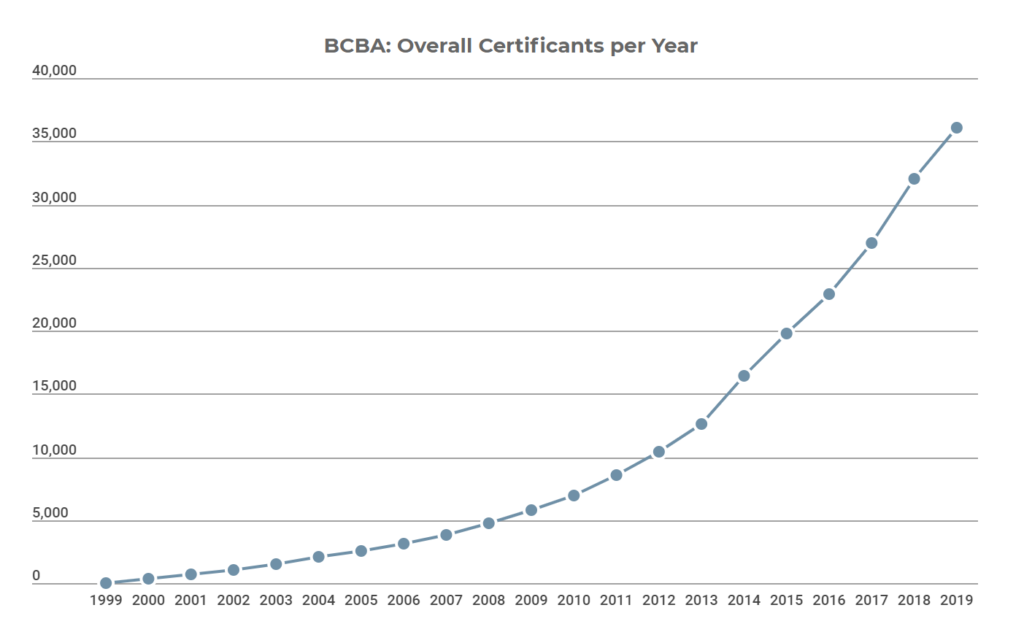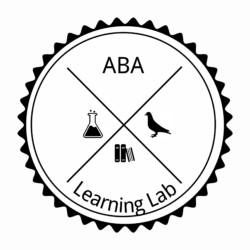James Macon, M.Ed, BCBA, LBA
If you’re reading this, there’s a good chance you’re preparing for the upcoming BCBA test. And yes… the test is difficult. The academic question is though, is it getting harder? And if so, why?
The simple answer is yes. Objectively speaking, the percentage of candidates passing the test on their first attempt has steadily decreased. The BACB provides data on the number of candidates who take the test each year and the respective pass rates. The number of applicants who passed their test on the first attempt has steadily decreased from 71% in 2015, to 61% in 2018 (see figure 1). A similar decreasing trend can be seen for retakes, decreasing form 38% to 32%, respectively.
| 2015 | 2016 | 2017 | 2018 | ||
|---|---|---|---|---|---|
| Number of Candidates Tested | |||||
| First Time | 541 | 812 | 1,012 | 1,253 | |
| Retakes | 334 | 341 | 493 | 751 | |
| Percentage of Candidates Passing | |||||
| First Time | 71% | 65% | 65% | 61% | |
| Retakes | 38% | 37% | 35% | 32% |
Figure 1. BCBA exam pass rate per year. Source, www.bacb.com
Regarding our original question though, a more complex analysis suggests the test might not be more difficult. For starters, there are significantly more BCBA certificants each and every year. If the test was truly getting more difficult, how could we account for the increase in BCBA? See figure 2, courtesy of the BACB. The real answer may have to do with how and where these prospective behavior analysts are being trained.

Figure 2. Overall BCBA certificants per year. Source, www.BACB.com
The growth rate our profession is incredible, and a testament to the demand for behavior analytic services. To attempt to keep up with this demand, our field has seen an explosion in the number of universities offering BACB verified course sequences (VCS). The reality is that these university programs are not all created equal. The pass rates can vary wildly from university to university, ranging between 18% and 100%. This data suggests it pays to do some research on which university program you are interested in before enrolling. Attending a university with a low pass-rate does not mean you will not pass the test, but it should indicate the need for using extra test preparation (we tend to like studyABA.com, but more on that below).
The other important variable for consideration is that behavior analysis is steadily becoming an international profession. While the vast majority of universities and practitioners are in the US, the BACB, ABAI, and other organizations (e.g., the Global Autism Project) have been doing everything possible to help disseminate our science to other countries.
One challenge of course is that most behavior analytic text books are written in English. The implications are if you’re a student in the Czech Republic or Japan, you will have to read and learn about behavior analysis in a language that is not your native tongue. This certainly can have an impact on the pass rate, especially with more and more international citizens taking the exam.
The BACB understands this challenge, and has slowly been adding additional languages for the exam (a total of 9 currently available, with another 4 slates for the near future). Many authors and publishers are also having their work translated into different languages. All of this will help further disseminate our science, and ultimately, improve the state of our field. Until then, what can you do to improve your chances of passing the BCBA exam? Here are a few suggestions:
1. Study prep software
You’ve completed your coursework and experience, now it’s time to study for the test. Multiple choice exams have their own method to them, and if you want to pass, you’ll probably want to use some study prep software. We recently wrote a review on some of the different options out there. While we think they all do a pretty good job, we tend to like StudyABA.com. We also like the BDS modules.
2. Speak Behaviorese
While behaviorese may not be a real language, you hopefully get the point. When preparing for the test, you should practice analyzing and speaking everything through a behavior analytic lens. This is especially helpful in a group of likeminded individuals hopefully studying for their test as well
3. Study Group
This could have been lumped into speaking behaviorese, but it deserves its own category. Have a study group builds accountability. Properly preparing for the test is difficult, but having others who can motivate you and keep you accountable can be the difference between passing and failing.
Do you have some other ideas on why the pass rate is changing, or some tips on how to pass the test? Share them in the comments below!


Thank you for writing this. I am sitting in 2 weeks for the first time. Why is that the re-takers rates drop dramatically.
I wonder what would be the rate for ESL learners…I am not native. Ha ha. Thanks a ton.
Re-takers become over-confident. They fail to maintain discriminative skills in every area of the Task List. Re-takers only study known weak areas but fail to continue to execute the numerous key designs of effective studying. I have not taken the exam yet. I sit for it on April 20, 2021. I am prepared to pass- but just in case I don’t – I will keep my momentum going in order to pass. I am thankful of this research from one of my instructors.
Do you think it is a money contingency after2, 5, 7 retakes you pass ? Because you paying into the shortage area of test takers? How do you start your own clinic?